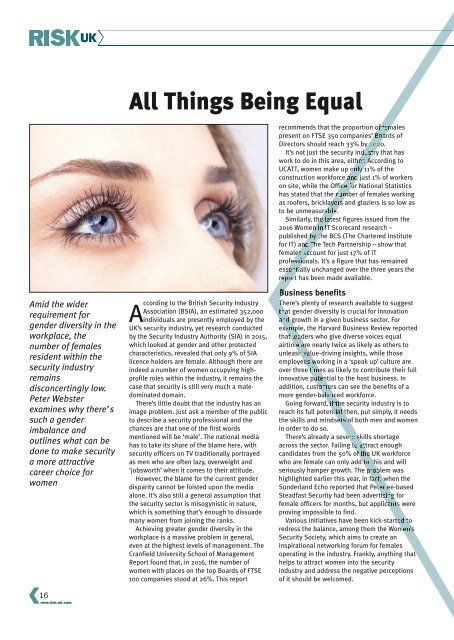RiskUKAugust2017
You also want an ePaper? Increase the reach of your titles
YUMPU automatically turns print PDFs into web optimized ePapers that Google loves.
All Things Being Equal<br />
recommends that the proportion of females<br />
present on FTSE 350 companies’ Boards of<br />
Directors should reach 33% by 2020.<br />
It’s not just the security industry that has<br />
work to do in this area, either. According to<br />
UCATT, women make up only 11% of the<br />
construction workforce and just 1% of workers<br />
on site, while the Office for National Statistics<br />
has stated that the number of females working<br />
as roofers, bricklayers and glaziers is so low as<br />
to be unmeasurable.<br />
Similarly, the latest figures issued from the<br />
2016 Women in IT Scorecard research –<br />
published by the BCS (The Chartered Institute<br />
for IT) and The Tech Partnership – show that<br />
females account for just 17% of IT<br />
professionals. It’s a figure that has remained<br />
essentially unchanged over the three years the<br />
report has been made available.<br />
Amid the wider<br />
requirement for<br />
gender diversity in the<br />
workplace, the<br />
number of females<br />
resident within the<br />
security industry<br />
remains<br />
disconcertingly low.<br />
Peter Webster<br />
examines why there’s<br />
such a gender<br />
imbalance and<br />
outlines what can be<br />
done to make security<br />
a more attractive<br />
career choice for<br />
women<br />
According to the British Security Industry<br />
Association (BSIA), an estimated 352,000<br />
individuals are presently employed by the<br />
UK’s security industry, yet research conducted<br />
by the Security Industry Authority (SIA) in 2015,<br />
which looked at gender and other protected<br />
characteristics, revealed that only 9% of SIA<br />
licence holders are female. Although there are<br />
indeed a number of women occupying highprofile<br />
roles within the industry, it remains the<br />
case that security is still very much a maledominated<br />
domain.<br />
There’s little doubt that the industry has an<br />
image problem. Just ask a member of the public<br />
to describe a security professional and the<br />
chances are that one of the first words<br />
mentioned will be ‘male’. The national media<br />
has to take its share of the blame here, with<br />
security officers on TV traditionally portrayed<br />
as men who are often lazy, overweight and<br />
‘jobsworth’ when it comes to their attitude.<br />
However, the blame for the current gender<br />
disparity cannot be foisted upon the media<br />
alone. It’s also still a general assumption that<br />
the security sector is misogynistic in nature,<br />
which is something that’s enough to dissuade<br />
many women from joining the ranks.<br />
Achieving greater gender diversity in the<br />
workplace is a massive problem in general,<br />
even at the highest levels of management. The<br />
Cranfield University School of Management<br />
Report found that, in 2016, the number of<br />
women with places on the top Boards of FTSE<br />
100 companies stood at 26%. This report<br />
Business benefits<br />
There’s plenty of research available to suggest<br />
that gender diversity is crucial for innovation<br />
and growth in a given business sector. For<br />
example, the Harvard Business Review reported<br />
that leaders who give diverse voices equal<br />
airtime are nearly twice as likely as others to<br />
unleash value-driving insights, while those<br />
employees working in a ‘speak up’ culture are<br />
over three times as likely to contribute their full<br />
innovative potential to the host business. In<br />
addition, customers can see the benefits of a<br />
more gender-balanced workforce.<br />
Going forward, if the security industry is to<br />
reach its full potential then, put simply, it needs<br />
the skills and mindsets of both men and women<br />
in order to do so.<br />
There’s already a severe skills shortage<br />
across the sector. Failing to attract enough<br />
candidates from the 50% of the UK workforce<br />
who are female can only add to this and will<br />
seriously hamper growth. The problem was<br />
highlighted earlier this year, in fact, when the<br />
Sunderland Echo reported that Peterlee-based<br />
Steadfast Security had been advertising for<br />
female officers for months, but applicants were<br />
proving impossible to find.<br />
Various initiatives have been kick-started to<br />
redress the balance, among them the Women’s<br />
Security Society, which aims to create an<br />
inspirational networking forum for females<br />
operating in the industry. Frankly, anything that<br />
helps to attract women into the security<br />
industry and address the negative perceptions<br />
of it should be welcomed.<br />
16<br />
www.risk-uk.com

















